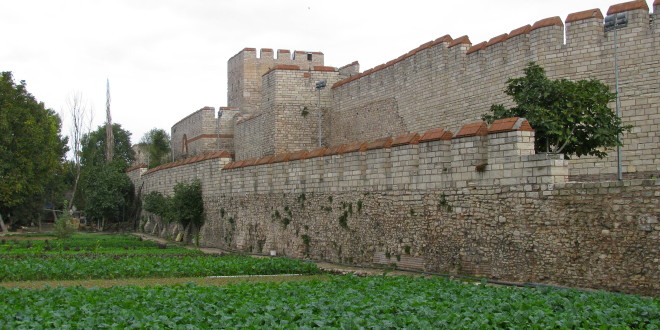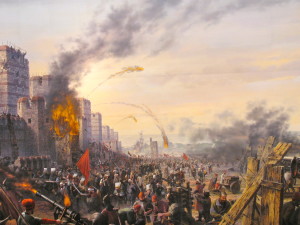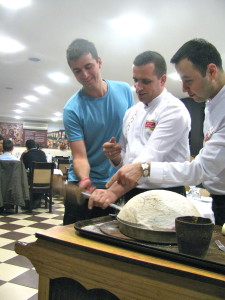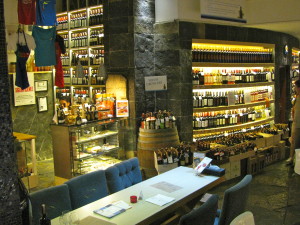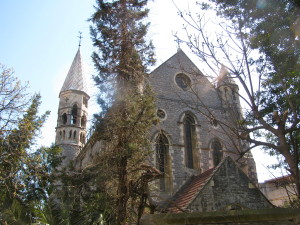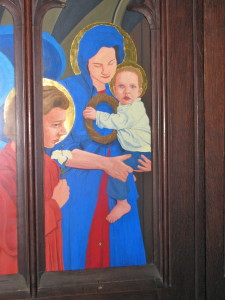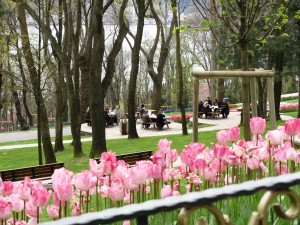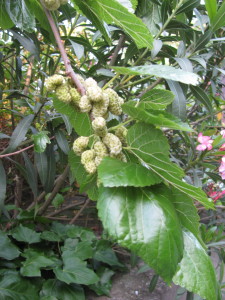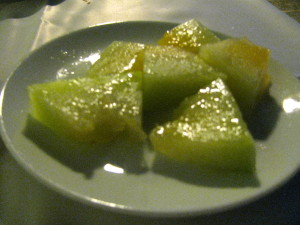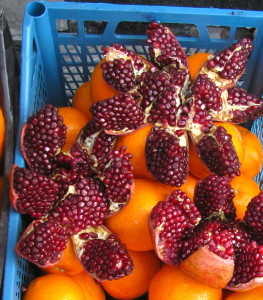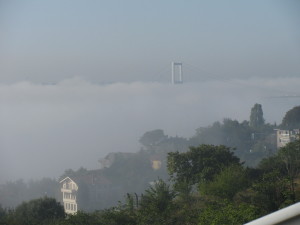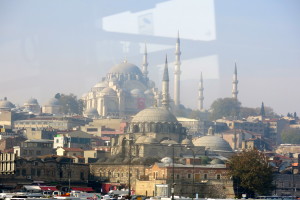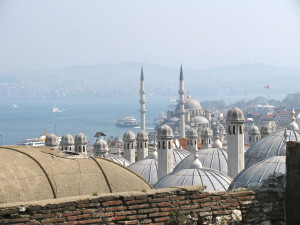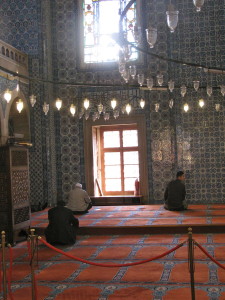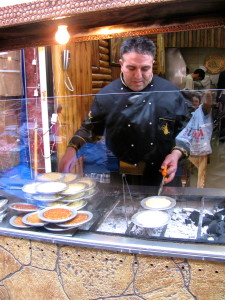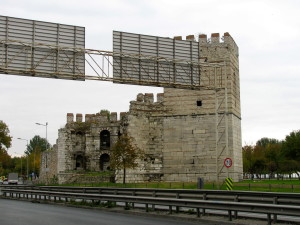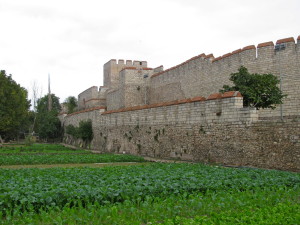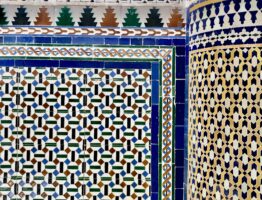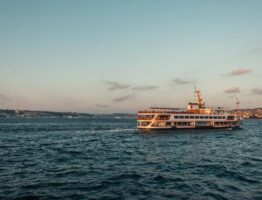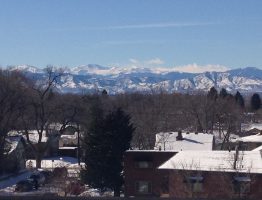Sankar’s job was winding down. He had already started working on projects in other parts of the world. It was time to head home. “We’ll be home for Christmas,” I told Angela on the phone. I loved those sentimental words.
“No,” she replied. “I want one more Christmas in Istanbul.” Greg agreed.
Sankar and I were surprised, but pleased.
Even though our kids had visited the past summer, we had new things to show them. The Panorama Museum, with its 360-degree floor-to-ceiling murals that put visitors in the middle of the battle for Constantinople. Akdeniz Hatay Sofrası, where you could call ahead and order delectable chicken or lamb roasted in a salt casing. Sensus, a new wine bar next to the Galata Tower. The Anglican church we’d belatedly joined, Crimean Memorial.
On Christmas Eve, the temperature in the fifties, the four of us drove to the nearby suburb of Gayretepe (gayret = endeavor; tepe=hill) and left the car in a parking ramp. Then we jumped on the metro to Taksim Square. We walked the length of Istiklal Avenue, passing roasted chestnut vendors, window-shopping, and admiring the holiday lights that arched over the iconic street. We ran into Pastor Ian, sitting outside a coffee shop smoking a cigar with a friend, and stopped at Sensus for a glass of wine and some hors d’oeuvres. Fortified, we headed to church.
We arrived at the service early to get seats. The church was filled with people we knew. Robbie, a Californian who had married a Turk and worked in public relations for the AKP Party. Robbie had always been particularly friendly to me. Professor William Hale and his wife, Kathleen, Brits with whom we’d gone on ARIT trips. I had been surprised at William’s fluency in Turkish. Beate, a long-time Istanbulu from Germany, who had invited me to dinner at her historic Terabya home one weekend when Sankar was away.
We gave up our seats to Warren Winkler, an eighty-something American physician who had worked in Turkey since World War II, and his stylish Dutch wife, Ineke. We had attended a party at their lovely, unusual home, a former Turkish bath.
I love evening church services and this was our first in our new church’s late nineteenth century building, with its choir screen separating the altar from the nave, adorned with frescoes including one of the Christ child grasping a simit (Turkish bagel).
After the service, we spoke with a British couple we had recently met. They were new in Istanbul. Now I hugged her goodbye, feeling wistful: all the confusion and exhilaration of the city was ahead for her. For us, well, movers would arrive as soon as the kids left.
Ümit was taking our guest beds and the desk Sankar had so thoughtfully purchased for me before I arrived. We were shipping most everything else back home. But what to do with our liquor? We owned a surprising amount, given that we rarely drank it. A large bottle of rum, which I’d bought for a cake recipe—a smaller size wasn’t available and, with fifty percent tax, the bottle had cost close to $75. Two bottles of rakı, Christmas gifts from 3M Turkey (along, one year, with a carton of Marlboros). A bottle of gin, and some scotch left over from when Sankar’s brother visited.
We decided to give all of these spirits to our 3M friends, Gökhan and Burcu, who had invited the four of us for a final meal at their apartment. That evening, we loaded all our bottles into the trunk of our car for the drive over the bridge and into Asia. When we reached their place, we discovered that the rum had spilled all over the inside of the trunk. We carried the rest of the bottles into their apartment and forgot about the rum.
We stayed late at Gökhan and Burcu’s apartment that night, and didn’t get back home until after midnight. The kids were flying out early the next morning; we’d be back in the car again by 5:30.
It was still dark as we set out for the airport. Sankar took the freeway entrance toward Atatürk International and accelerated confidently; there was little traffic at this time of day. But then he noticed several police cars, and an officer standing on the left side of the road, motioning us over. We stopped—had we been speeding?—and Sankar rolled down his window. The officer leaned in and without a word, stuck a plastic device in Sankar’s face. Then, issuing a sharp command, he shoved the breathalyzer right into his mouth.
The car still reeked with the fumes from the spilled rum, and I turned toward the kids, my eyes wide. Sankar passed the test and the officer waved us on. But we were shaken. “Can I get sick from having something like that in my mouth?” he asked.
It was the flip side of that Turkish order and kontrol we’d so often admired.
I had started leaving Istanbul months before our departure. I began by saying goodbye to seasonal treats I knew I’d miss. In April: grand gardens of tulips in every shade of pink, red, and yellow, and hundreds of ordinary roadside plantings. Goodbye, lale!
In June: mulberries, little white sweetnesses dangling from tree branches, fortifying my ascent from sea to apartment. Goodbye dut!
In summer: the juiciest, most luscious melons I have ever tasted, some with orange or yellow fruit, others bright green. They lasted for a while after harvest, but finally in mid-fall I ate my last one. Goodbye, wonderful kavun!
Then it was time for pomegranates, ruby red and bursting with flavor. They were still in season as I left Asia Minor, but goodbye nar!
And the sea, a visual reward. I would so miss those unexpected glimpses of pale blue water shimmering at the turn of a street, or a spray of mist as the car rounded a bend. I didn’t say goodbye, but I tried to fix each dreamlike view in my mind.
I also began saying goodbye to the language I’d tried so hard to learn. Ever since my summer visit home, my Turkish skills had been weakening. I could no longer understand conversations as well as I had in May and June, and my speech became more hesitant. “From now on, I’m going to listen to at least an hour of Turkish television each day,” I declared in my final months, but then avoided doing so.
As I intensified my wanderings around the golden city, checking off items to see one last time, I was pulling back. While I tried to stay in the moment, I could also see myself as I’d soon be: far away.
Maybe 55 had been the perfect age to meet Istanbul. I had been ready for its melancholy, what Orhan Pamuk calls the city’s huzun. The visitor is constantly reminded that Istanbul is old, and it is a reminder that you, too, will be old.
Filled with huzun, I had, more than once, longed for an entire life lived in Istanbul. To know all of its wisdom and secrets. I had learned to make difficult personal changes here. I had learned to create optimism and to cope with things I didn’t agree with. I had learned to accept lavish hospitality that I, myself, could not reciprocate. I had been humbled in Istanbul, but I had also stood up for what I believe in. But surely there was a lot more the city could teach me.
In the apartment when all was quiet, I took stock. Had our marriage improved? Had we made a better go of things here than in Costa Rica? Yes to both. Our marriage had been strengthened through discovery of shared interests, particularly in ancient and medieval history. This discovery had occurred in great part because I had opened myself up to it. I had set out for Turkey with a positive attitude, and had (mostly) refrained from complaining.
Had Turkey solved all of our problems? Surely not. I still lamented my lack of professional success, and sometimes, took out negative feelings on Sankar. And Sankar still had a tendency to brush off my concerns. But I smiled as I recalled his frequent efforts to make me happy here, cobbling together bits of Turkish, Spanish, and English to help us find the way to our next historic treasure.
Turkey had showed me that I could overwrite the patterns we’d developed in Costa Rica. That I could break the cycle of resentment and blame, and instead speak up and ask for resources to help me succeed. When a space was cleared that had once been full of negativity, there was room in our marriage to let common interests bloom. We had grown closer through our magical explorations with ARIT and by hosting numerous visitors. We had made wonderful new friends, and we had a list of Turkish places, such as the lost Armenian city of Ani, that we still wanted to visit together. Forever now, at least when we talked about Turkey (and we would talk about it a great deal), we’d talk as a team.
The most challenging experiences often produce the most rewards. The year spent teaching—the hardest job I’d ever had—had actually been a balm. It had provided a crucial sense of accomplishment, enhancing my sense of self and easing our fraught expatriate relationship. It had given me insights into the Turkish culture that I wouldn’t have gained sitting in our apartment or hanging out with other expatriates. And it had allowed me to be the kind of American I wanted to be: hardworking and dedicated. For a long time after I left Turkey, I would think of ÖzU as my employer, and its teachers as my colleagues.
My job had also pointed the way to a new career: teaching English as a Second Language.
I was proud of how I’d handled the challenge of Turkey, and I was already looking back on the experience with satisfaction. I would not only miss Turkey, but I’d miss myself in Turkey. I had, for the most part, been wise here.
Finally, our last morning—a Saturday in January. We’d already bid farewell to our Turkish and expatriate friends, our apartment, and our neighborhood, moving for our two final days to the Radisson Blu in Ortaköy. Ümit was busy with a family matter, so we’d already said our goodbyes to him. We expected to take a cab to the airport, but Taner, Waverley’s driver, did something I would surely not have thought to do: he volunteered to get up early on his day off so that our last ride wouldn’t be an impersonal one. He arrived at 5:15 am to take us to the airport.
In Istanbul, traffic is never far from mind, but as Taner turned left out of the Radison Blu, I smiled. The Sea Road was ours this morning! We were in for a quick ride on the most consistently clogged road in the city. Over the years, I had sat for what seemed like hours on its surface, studying the shiny, black and white photographs of Atatürk’s life on the Yildiz Parki walls to pass the time. Now, we whizzed along, and I busied myself trying to think of something pithy to say to Taner to mark our last car ride in Istanbul.
We were approaching the Galata Bridge when I emerged from my reverie. Just ahead was Eminönü, the centuries-old, maze-like commercial area I’d been most drawn to during my time in the city. I hadn’t planned to see Eminönü again; Ümit would have taken us on a newer route west of the city. But here it was, in all its ancient splendor. And like me, it was just waking up.
The rising sun was hitting the dome of the Suleimaniye Mosque, Sinan’s sixteenth century masterpiece, at the very top of Istanbul’s Third Hill. The largest mosque in Istanbul: how many times had I climbed crowded streets past Istanbul University to visit this house of worship? How many times had I gained a sense of peace from its soaring, taupe and terra cotta interior and enjoyed a timeless view from the green expanse on its north side?
From Suleimaniye, Eminönü’s buildings cascaded down the hill toward me, so crowded together that they looked as though they stood on risers. It was as if the heart of Istanbul had convened a special chorus to bid me farewell. I felt emotions rising; how was I going to go on living without weekly trips to Eminönü?
Still dark, but its outlines visible, on the right side of the “choir” stood the small Rustem Pasha Mosque, another Sinan jewel, adorned with precious Iznik tiles. The mosque had been built on top of a block of businesses. I had been inside it a half dozen times and just the week before, had ascended to its courtyard on the way to a nearly-hidden spice vendor with Greg.
“Take off your shoes and go in,” I urged him impulsively, and he did so without protest, emerging some minutes later to remark, “It felt really good in there.”
The Spice Bazaar itself, Byzantine-striped and surprisingly diminutive given all that it contained, stood in the front row. To its left, the multi-domed 17th century New Mosque, my absolute favorite; I always felt like I was inside a cloud when I stood in its sanctuary. The plaza between the two, usually bustling with visitors and pigeons, was dark and quiet. Behind them receded a tangle of little streets winding up to the Büyük Valide Han, where we loved climbing to the roof and hearing surround sound prayer call.
And finally, in front like a featured soloist, the magnificent Hamdi Restaurant, overlooking the Golden Horn, where we always took guests for their first lunch. They never failed to marvel at the view of water, medieval towers, and minarets that seemed only to lack a flying carpet or two.
How often had I walked in and out of Eminönü’s shops, buying boxes, cooking chocolate, coffee cups, Turkish Delight? Enjoying smoky whiffs of grilled beef, lamb, and chicken. Stopping for a morning su boreği, or an afternoon kunefe at the outdoor lokanta where a hatchet-faced man stood day after day grilling the melted cheese and syrup dessert. How many tiny tulip cups of tea did I sip in shops throughout Eminönü? How many times did I climb up through the maze to the Grand Bazaar or walk down from the Bazaar in the late afternoon when bescarfed Turkish shoppers were out in force?
We expatriates joked that everything in the world could be found behind the Spice Bazaar, and it was true. Buttons, fabric for a Christmas tree skirt, Turkish coffee, barbecue grills, outlet strips, Jordan almonds, the idiosyncratic red and white tea sets everyone used, googly eyes for a children’s craft project, umbrellas of every design. . . there was even an entire store dedicated to baby showers.
I wanted one more moment with the Eminönü choir, but we were already across the bridge. As Taner turned left, I gulped and blinked away tears. Sankar was intent on a text message to China, working as usual, which somehow seemed appropriate. He had worked much of the experience away, and that had given him other insights.
A moment later the fanciful pink Sirkeci train station, the last stop on the Orient Express, came into view. How I had enjoyed pointing out this belle époque edifice to visitors on our way to Sultanahmet. Now we were heading west on John F. Kennedy Caddesi, an eight-mile stretch that hugged the Sea of Marmara. The ruins of Emperor Theodosius’ double-thick sea walls lined both sides of the road. Built of stone and double-baked brick in the 400s and never breached, they were worn to an oatmeal-like texture, crumbling to nothing in some places and rising impressively in others. Several bus stops and two lighted billboards—one for KFC and one for something called Kofte-mania—stood in front of them, a metaphor for the mix of profound history and bright novelty that is Istanbul.
On we went, one mile, two, and then finally a big corner chunk of wall arose on our left, the Marmara Sea glistening behind it. This is where the sea walls turn at a right angle away to march across land, becoming the land walls. I looked to my right for a last glimpse of Constantinople’s land walls, climbing north with the slope of the land and then finally curving east to meet the water at the Golden Horn. They were considered state-of-the-art for a thousand years but, thanks in part to the invention of cannons, a section was finally breached in 1453, allowing the Turks their turn in this marvelous city.
The corner chunk was a farewell sentry. Now we were outside the walls, the Old City behind us, passing handsome modern apartment complexes, hotels, and a convention center. We turned and drove under the grand, Soviet-like arch that announced Atatürk Havalımanı, parked, and got out of the car, pulling suitcases loaded with Turkish clothing, jewelry and gifts. Taner could have simply dropped us off, but he came in and waited until all our ticketing and baggage was taken care of. Even at the very end, unexpected generosity. “We can never out-nice these people,” I thought for the umpteenth time.
We had come down from our magic carpet ride. Back in America I would feel an odd exhilaration: I had seen so much beauty, majesty, and wonder; I had challenged myself and grown more than I thought possible; surely I had something to new to offer to my country. But I also felt, with great conviction, that nothing else I experienced would ever be as profound.
Turkey. Asia Minor. Quite simply: where we come from.
Inside the airport, checked in and through passport control, I glanced at Sankar. He would never think of weeping in public, but as we headed to our gate, he stopped and looked back toward where we’d just bid Taner goodbye. He paused for a moment and then he looked at me beside him, and nodded. Together, we walked toward the waiting airplane with the same thought in mind. We had been happy here.
